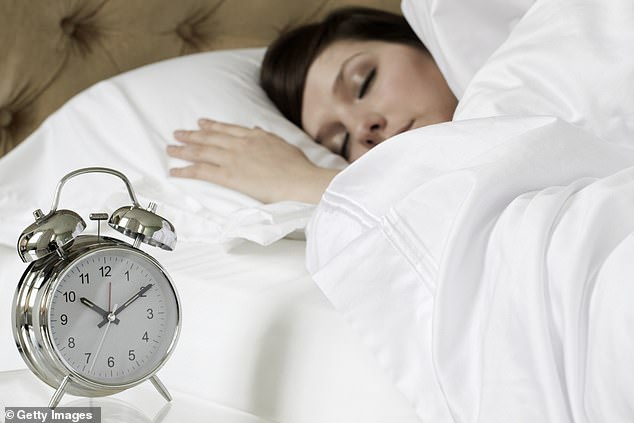- Late bedtimes disrupt the body’s internal clock and trigger a hormonal reaction
Women hoping to get pregnant should head to bed no later than 10.45pm, a study claims.
Researchers tracked 4,000 women of childbearing age over a five-year period to see how bedtimes affected their chances of conceiving.
The results showed those regularly hitting the hay after 10.45pm were 22 per cent more likely to have problems with their fertility.
Getting enough sleep is known to be important for remaining fertile, but the study shows it is not just the amount of sleep that counts – avoiding late nights is also crucial.
Up to 15 per cent of couples in the UK have problems conceiving – defined as the failure to become pregnant after 12 months or more of regular unprotected sex.

Women trying to get pregnant should aim to get to bed for 10.45pm, a new study has found (file photo)

Up to 15 per cent of couples in the UK have problems conceiving, defined as failing to become pregnant after 12 months of regular unprotected sex
Around 30 per cent of cases are due to the woman, 30 per cent to the man and the rest to both, or an unknown cause.
Scientists at the Second Xiangya Hospital in Hunan, China, surveyed the women between 2015 and 2020 to see how sleeping regimes affected pregnancy rates among those actively trying to start a family.
They ruled out other factors that might reduce the chances of conception such as obesity, smoking and high alcohol intake.
The results, published in the scientific journal Frontiers in Endocrinology, showed little variation in fertility rates among those with bedtimes up to 10.45pm.
Past this time, there was a sharp decline – more than a fifth – in a woman’s chances of becoming pregnant.

Later bedtimes disrupt the body’s internal clock and trigger a hormonal reaction which reduces the likelihood sperm will fertilise a woman’s egg, researchers believe
Researchers believe later bedtimes disrupt the body’s internal clock and trigger a hormonal chain reaction which reduces the likelihood that a sperm will fertilise a woman’s egg.
The team said: ‘Reproduction is intricately controlled by hormonal mechanisms. Any disruption to these may result in infertility.
‘The fast-paced nature of modern society has resulted in significant alterations to people’s lifestyles… an increasing number tend to delay their bedtime.
‘These findings are valuable information for women of childbearing age.’









